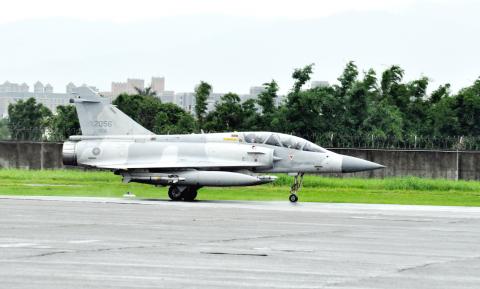A Mirage 2000 jet fighter crashed into the sea yesterday morning, but its two crewmembers managed to eject to safety and were rescued.
It was the second air force jet fighter to be lost in less than a week after an F-16 crashed into the sea on Wednesday. Its pilot was also rescued.
All of the air force’s F-16s were grounded after the incident.

Photo: CNA
The air force said contact with the Mirage 2000 was lost at 10:18am, while the aircraft was on a training mission off Hsinchu County.
The air force said the crew, Lieutenant-Colonel Liu Yuan-hsiang (劉永祥), 38, and First Lieutenant Cheng Yu-teng (鄭育騰), 27, were rescued from the sea by an S-70C helicopter.
The pair, who were sent to a Hsinchu hospital, suffered only slight injuries.
The air force said the Mirage took off at 9:54am from Hsinchu Air Base and its crew ejected from the fighter in accordance with flight regulations after a red alarm light began to flash.
It said an investigative task force has gone to Hsinchu to look into the incident.
Taiwan procured 60 Mirage 2000s from France in 1992. Counting yesterday’s incident, four have now crashed.
Asked by reporters whether Taiwan’s air defense capabilities have been compromised with both F-16 and Mirage jets grounded, Air Force Chief of General Staff Major General Ding Chung-wu (丁忠武) said the air force’s 144 F-16s had all been cleared for operations yesterday, so the nation’s air defense was not weakened.
The military had originally planned to dispatch two F-16s to participate in a joint drill conducted by navy and Coast Guard Administration personnel on Thursday in waters south of Taiwan, but following last week’s crash, Mirage 2000 jet fighters were deployed from Hsinchu to take part instead.
The joint drill was held to show the government’s determination to protect Taiwanese fishermen operating there, following the fatal shooting of fisherman Hung Shih-cheng (洪石成) by Philippine Coast Guard personnel in waters where the exclusive economic zones of Taiwan and the Philippines overlap.

DAREDEVIL: Honnold said it had always been a dream of his to climb Taipei 101, while a Netflix producer said the skyscraper was ‘a real icon of this country’ US climber Alex Honnold yesterday took on Taiwan’s tallest building, becoming the first person to scale Taipei 101 without a rope, harness or safety net. Hundreds of spectators gathered at the base of the 101-story skyscraper to watch Honnold, 40, embark on his daredevil feat, which was also broadcast live on Netflix. Dressed in a red T-shirt and yellow custom-made climbing shoes, Honnold swiftly moved up the southeast face of the glass and steel building. At one point, he stepped onto a platform midway up to wave down at fans and onlookers who were taking photos. People watching from inside

A Vietnamese migrant worker yesterday won NT$12 million (US$379,627) on a Lunar New Year scratch card in Kaohsiung as part of Taiwan Lottery Co’s (台灣彩券) “NT$12 Million Grand Fortune” (1200萬大吉利) game. The man was the first top-prize winner of the new game launched on Jan. 6 to mark the Lunar New Year. Three Vietnamese migrant workers visited a Taiwan Lottery shop on Xinyue Street in Kaohsiung’s Gangshan District (崗山), a store representative said. The player bought multiple tickets and, after winning nothing, held the final lottery ticket in one hand and rubbed the store’s statue of the Maitreya Buddha’s belly with the other,

‘NATO-PLUS’: ‘Our strategic partners in the Indo-Pacific are facing increasing aggression by the Chinese Communist Party,’ US Representative Rob Wittman said The US House of Representatives on Monday released its version of the Consolidated Appropriations Act, which includes US$1.15 billion to support security cooperation with Taiwan. The omnibus act, covering US$1.2 trillion of spending, allocates US$1 billion for the Taiwan Security Cooperation Initiative, as well as US$150 million for the replacement of defense articles and reimbursement of defense services provided to Taiwan. The fund allocations were based on the US National Defense Authorization Act for fiscal 2026 that was passed by the US Congress last month and authorized up to US$1 billion to the US Defense Security Cooperation Agency in support of the

‘COMMITTED TO DETERRENCE’: Washington would stand by its allies, but it can only help as much as countries help themselves, Raymond Greene said The US is committed to deterrence in the first island chain, but it should not bear the burden alone, as “freedom is not free,” American Institute in Taiwan Director Raymond Greene said in a speech at the Institute for National Defense and Security Research’s “Strengthening Resilience: Defense as the Engine of Development” seminar in Taipei yesterday. In the speech, titled “Investing Together and a Secure and Prosperous Future,” Greene highlighted the contributions of US President Donald Trump’s administration to Taiwan’s defense efforts, including the establishment of supply chains for drones and autonomous systems, offers of security assistance and the expansion of